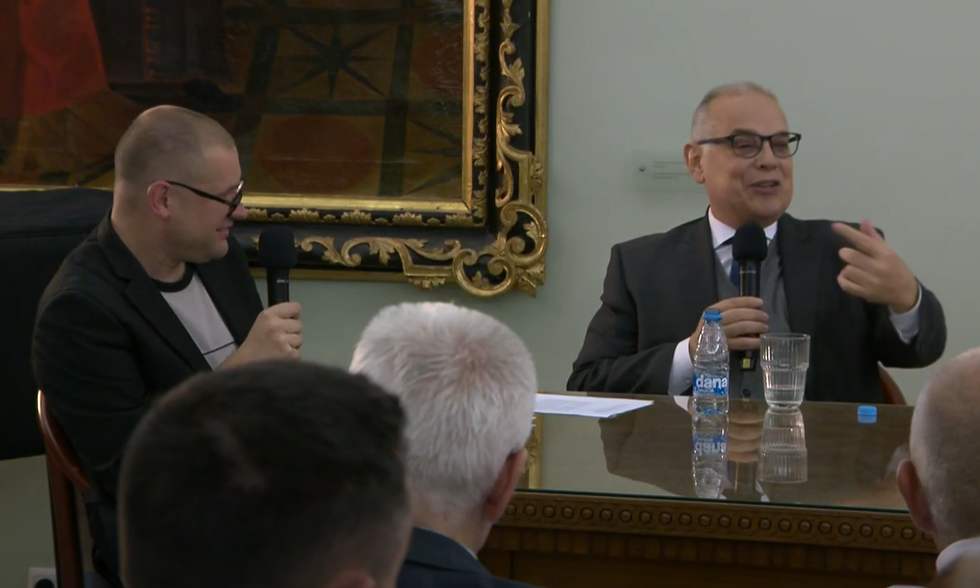“It is possible to win this fight,” said Alejandro Peña Esclusa, bestselling author of books on electoral fraud, in front of a packed Knights’ Hall in Maribor Castle. Peña Esclusa believes that Marxist ideas, including cultural Marxism, do not work in the long run, and more and more people are realising that this is true.
On Tuesday night in Maribor, in the Knights’ Hall (Viteška dvorana) of Maribor Castle, a conversation took place with Janez Janša, President of the Slovenian Democratic Party (Slovenska demokratska stranka – SDS), and Alejandro Peña Esclusa, Venezuelan author of books on electoral fraud in Latin America. The discussion was moderated by Ivan Štuhec, with opening remarks by Franc Kangler. Electoral irregularities can happen. But if this always benefits one political option, then those are not irregularities – that is electoral fraud, which goes against human rights and freedoms that apply equally to all. The President of the Maribor Committee of the SDS party, Franc Kangler, began by saying that, first and foremost, we want what we have won and what we are still fighting for. Elections are still a reflection of a parliamentary democracy and must, above all, be fair.
The fairness of elections in South America was the topic of discussion at Tuesday’s discussion evening in the Knights’ Hall of Maribor Castle. “The main purpose of the meeting is to present a book on electoral fraud in Latin America,” said Janez Janša, adding that the book shows patterns that are also typical for other countries. “Unfortunately, we can also see some of them here,” he stressed.
Books are important because they offer solutions to resist the criminal system
Alejandro Peña Esclusa is a dissident of the far-left regime in Venezuela – a fact that has cost him dearly, as he has had to go into exile. The author of bestsellers such as The São Paulo Forum’s Cultural Welfare, and The Electoral Frauds of the São Paulo Forum – the Forum which the Latin American Communist International founded after the collapse of the Soviet Union, reveals how certain structures come to power and use every method available to stay there. “I have written ten books so far, but the last two are also books of hope. They are not just indictments of the current situation, because they also offer solutions,” he pointed out.
It all started with Fidel Castro, the Cuban communist dictator who founded the Forum São Paulo. Communism is a violent ideology, but violence only works for so long. That is why he recommended to all friendly leaders in South America, to violent guerrilla groups and to people like Hugo Chavez, “who has already staged two military coups in my Venezuela,” pointed out Peña Esclusa, “to lay down their arms and stick to elections.”
Venezuela was the guinea pig
Drawing from the founder of the Italian Communist Party, Antonio Gramsci, weapons were indeed replaced by ideas aimed at destroying the values and culture of Western civilisation in Latin America. The march to power had begun, and after winning, they began to resort to electoral fraud to stay on top. And Venezuela was their guinea pig. “It is true that these people are very capable in the cultural struggle. But the problem is that in recent years, the members of the centre and the right of the political opposition have not had the courage to engage in this cultural war,” the political dissident pointed out.
Deceit through electoral law
Communists have increased their presence in universities, the arts, the media, and the means of communication – and thus promoted their own ideas. Anyone who dissented was destroyed by the media. And electoral manipulation is also possible here, in Slovenia. “First they come to power, then they set about changing the law in such a way that the next elections will go in their favour,” warned Janez Janša, adding that they have never managed to introduce controls through the State Election Commission to ensure that things run normally. A change to the electoral system has been proposed in the National Assembly that would abolish electoral districts. This would be a disaster, given the proportional electoral system and the introduction of the preferential vote. “If this were to be introduced, there would be no one left from the countryside in the Slovenian Parliament in four mandates, only from Ljubljana and the regional centres,” Janša believes.
In many constituencies where the centre-right usually records a good result, polling stations have been closed down, reducing voter turnout. Šmarje pri Jelšah is a good example of this. In Slovenia, according to Janša, it is not possible to use all the same tricks as in Venezuela, but “unfortunately, some of them can be used, and they definitely influence the result.”
However, Peña Esclusa believes that it is possible to win this fight, because the ideas of Marxism, including cultural Marxism, do not work in the long term, and more and more people are realising that this is the truth.
J. H.


